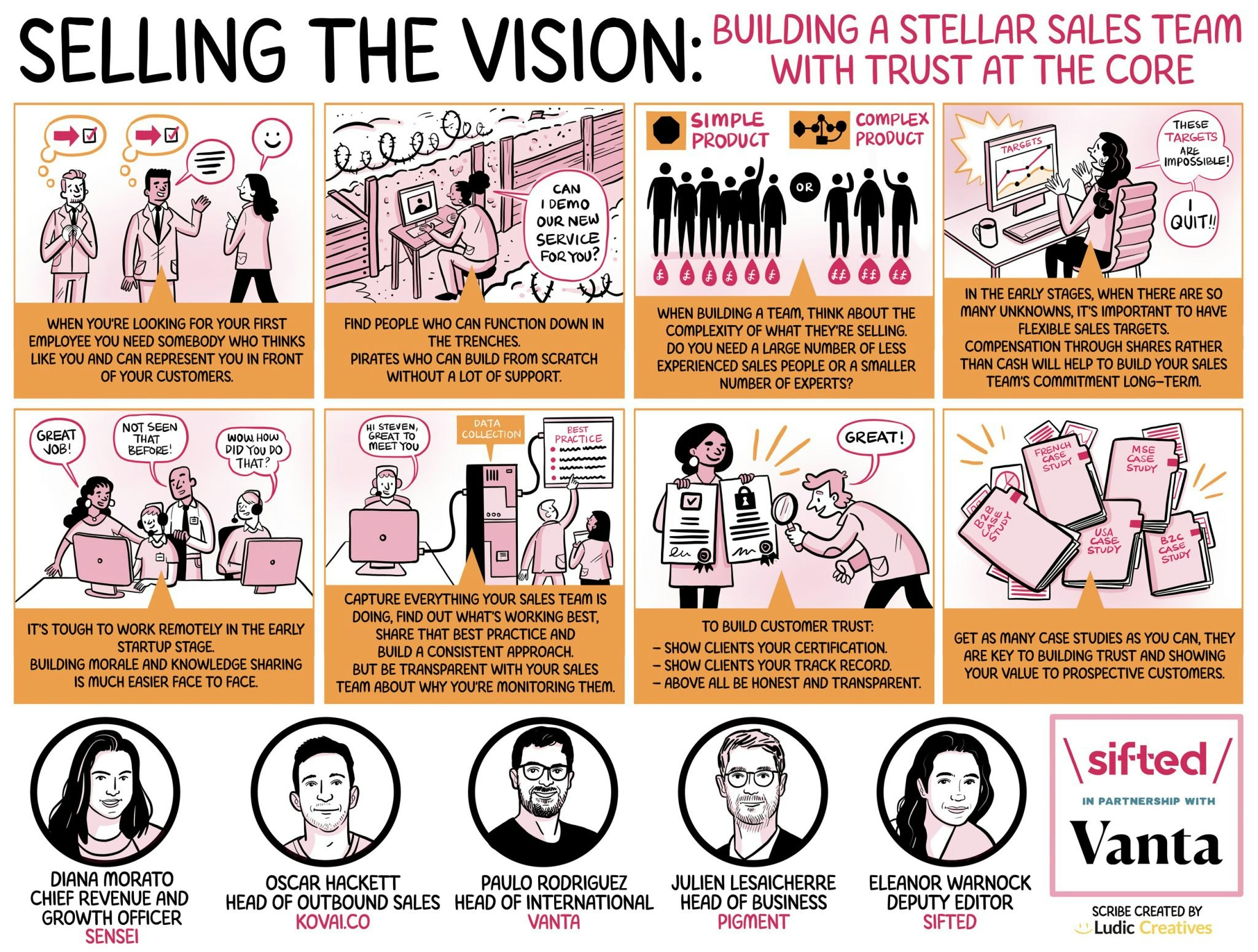Building a trusted sales team is crucial for growth, especially for early-stage startups. While founders are most important for a startup to land those first deals, a trusted team of sales leaders and sales development reps (SDRs) will lead to recurring revenue and sustainable growth.
So, what are the factors you should consider when making those first few sales hires — and how does it change while scaling, or in a downturn? In our latest Sifted Talks, we asked the experts to find out. They included:
- Oscar Hackett, head of outbound sales at B2B SaaS provider Kovai.co
- Diana Morato, chief growth officer at Sensei, a retail tech platform
- Paulo Rodriguez, head of international at automated security and compliance provider, Vanta
- Julien Lesaicherre, head of business at business planning solution, Pigment
Here’s what we learned:

1. Your first hire must be comfortable with chaos
For early-stage businesses, founders are the most valuable sales tool. They will have the clear vision and brand knowledge to close those crucial first sales, said Lesaicherre.
As the business scales, there will be the temptation to outsource sales. But this is a mistake, said Rodriguez — startups should instead prioritise finding the right business development leader to advise the founding team and implement proper sales processes.
For Morato, it’s key that the initial sales hires have strong communication skills. That doesn’t mean having the gift of the gab — but the ability to listen, learn and understand the brand’s value proposition.
Crucially, these salespeople can’t be too reliant on sales tools, so Hackett said leaders with extensive experience in enterprise might not be the right fit as they may lack agility.
“You want someone who's willing to get in the trenches… Stuff is going to break, stuff is going to fail — they need to be entrepreneurial, and happy to live in that chaos” — Oscar Hackett, Kovai.co
2. Profiles of hires change as you grow
For subsequent hires, the ability to adapt is still vital. But as the business grows, startups should hire based on the kind of products they’re selling.
If you’re selling to people in technical roles such as chief information officers (CIOs) or chief technology officers (CTOs), Rodriguez believes that hiring SDRs with a track record of engaging those kinds of profiles should be prioritised. But in most other cases, hungry graduates and second job talent should be fit for the job, said Hackett.
“At first, you have to optimise for commitment and character because it's going to be hard — you're going to have lots of rejections… As you grow and start to have a support setup for the team, you will go more for competency” — Julien Lesaicherre, Pigment
3. Use compensation to create a motivated team — not individuals
Despite the economic downturn, compensation for sales professionals hasn’t changed — as Morata mentioned, your SDRs should be paying for themselves.
The panel agreed that founders should be flexible with their targets, especially in the early stages. Setting a concrete goal that is too high can annoy your team, while setting it too low can kill motivation.
“At the beginning when you don't have that predictability and it's all about expanding the client base, you want to have a variable… to promote communication, which is really important, especially at the beginning of your journey” — Diana Morato, Sensei
4. Hybrid work is necessary for securing top SDRs
The experts agreed that sales teams do their best work in the office. This helps new teams build rapport and keeps morale high, said Hackett. At Vanta, the team is distributed, but all staff were expected to be in the office for their first year.
However, Morata said that the best talent in the market will expect some form of hybrid work after the first year.
“If you’re building for scale, you probably want to have at least six to 12 months in office — but then you need to go hybrid quite quickly, because otherwise, you're closing the doors on so much talent out there” — Morato
5. Accreditations are the currency of trust
Our panel agreed that securing accreditation for handling customer data is the quickest way to instil trust.
Lesaicherre said that while hiring SDRs with a track record of reliability and the right skills will still be important, customers want to know that you and your suppliers can be trusted with storing their data.
Rodriguez believes the mood in the market has changed: Data security and accreditations were barely mentioned five or six years ago, but are now a top priority for all buyers, he said. Hackett stressed the importance of getting the right certifications, describing a deal falling through for lack of regulatory diligence as the “most annoying way to lose”.
“There's this shift in the market where trust and demonstrating that trust is now a much higher currency than it was before” — Paul Rodriguez, Vanta
6. Adapt your proposition to sell in a downturn
Closing the conversation, the panel discussed how best to sell as market uncertainty continues. Hackett suggested pivoting your value proposition — instead of describing how the product will boost growth, reframe it as helping to save costs or increase efficiency.
Morata said that teams must go back to basics — listen to clients and understand their pain points. Don’t shy away from pricing conversations early in the process or you risk jeopardising deals by avoiding the conversation, said Lesaicherre.
For Rodriguez, engaging the team in your strategic vision is crucial in uncertain times as your SDRs are the ones keeping revenue up — this also helps keep them motivated.
“It's really about keeping the team engaged in what they're doing — not just their sales target, but they’re part of a company trying to achieve something big — and involving them in that plan from the get-go” — Rodriguez
Like this and want more? Watch the full Sifted Talks here:



